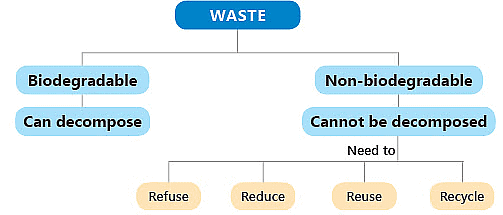Our Environment Class 4 Notes Science
| Table of contents |

|
| Environment |

|
| Pollution |

|
| Global Warming |

|
| Acid Rain |

|
| Water Pollution |

|
| Land Pollution |

|
| Quick Revision: Different Types of Pollution |

|
Environment
The environment is everything around us, like the air we breathe, the water we drink, the land we walk on, and the plants and animals. It also includes the weather.
Our environment gives us what we need to live, such as food, water, and air. It's important to take care of it so it stays healthy and keeps us alive.
Pollution
Environmental pollution happens when harmful substances or pollutants get into the environment, causing bad effects. These pollutants can come from different places like factories, cars, not getting rid of trash correctly, and other things people do or that happen naturally.
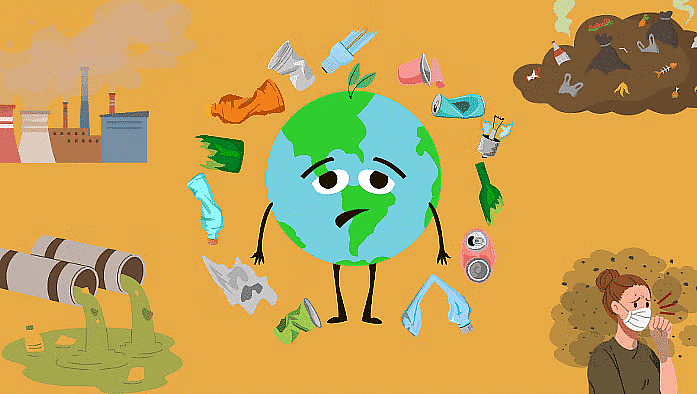
The most common types of environmental pollution include:-

- Doing things like cutting down trees, building more factories, and burning fuels make the air bad.
- Putting sewage from homes and factory dirt into rivers makes water dirty.
- Also, cutting trees, not throwing away trash right, and putting factory dirt on the ground makes the soil bad.
- Bad stuff, called pollutants, gets into the air, water, and soil, making pollution.
- It's really important to understand how our actions hurt the environment and try to do things in a way that keeps it healthy for plants and animals.
Air Pollution
Air pollution happens when harmful things get into the air and can make people sick and hurt the environment.
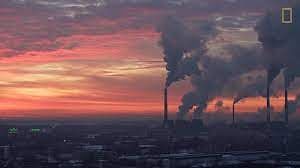
Causes of Air Pollution
- Burning fossil fuels in factories, power plants, and cars releases harmful substances.
- Vehicles, especially in crowded cities, emit pollutants when burning gasoline and diesel.
- Factories release chemicals and tiny particles during production.
- Farming with chemicals and raising many animals can also pollute the air.
- Improper trash disposal, including burning, releases harmful substances.
- Deforestation reduces the number of trees that clean the air.
- Natural events like wildfires, volcanoes, and storms can add pollutants.
- Air pollution harms health and the planet, so we need cleaner technologies and better environmental care.
Global Warming

Global warming refers to the gradual increase in the Earth's average temperature. This warming is mainly caused by human activities, such as burning fossil fuels (like coal, oil, and gas) and deforestation.
- Some activities let out greenhouse gases into the air, making a blanket that keeps heat around the Earth.
- Greenhouse gases, like carbon dioxide, methane, and nitrous oxide, trap heat from the sun.
- These gases warm up the planet, causing global warming and problems like changes in weather, higher seas, and other issues.
- To stop global warming, we need to make less greenhouse gases and use cleaner ways to get energy. Taking care of the environment is important too.
Acid Rain
- Acid rain is rain or snow that's extra acidic because of pollution.
- Pollution from burning fossil fuels, like sulfur dioxide and nitrogen oxides, makes acid rain.
- When these pollutants mix with water vapor in the air, they create acids that fall to the ground when it rains or snows.
- Acid rain hurts plants, animals in the water, and even buildings.
- We try to make less pollution to stop acid rain and keep the environment safe.

Water Pollution
Water pollution occurs when harmful substances enter rivers, lakes, or oceans, making the water unsafe for use. It affects plants, animals, and people who depend on clean water for their health and livelihood.
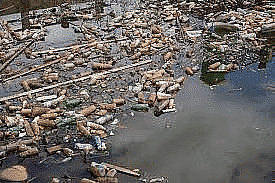
Causes of Water Pollution
- Factories release chemicals.
- Farming introduces fertilizers and pesticides.
- Urban areas contribute pollutants like oil and trash.
- Improper garbage disposal.
- Sewage and untreated wastewater.
- Oil spills harm aquatic life.
- Mining releases harmful substances.
- Air pollution deposits pollutants.
- Introduction of invasive species.
- Natural disasters introduce pollutants.
- Preventing water pollution requires regulations, sustainable practices, and awareness.

Land Pollution
Land pollution, also called soil pollution, happens when land gets dirty or damaged, often because of human activities.
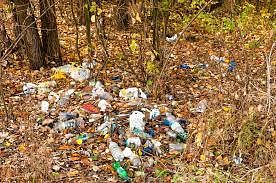
Causes of Land Pollution
- Dumping household and industrial waste improperly.
- Factories and industries releasing harmful chemicals.
- Using pesticides and fertilizers in farming.
- Mining activities releasing pollutants.
- Deforestation disrupting natural soil balance.
- Poorly managed landfills leaking harmful substances.
- Construction waste and debris.
- Oil spills contaminating the soil.
- Urbanization increasing waste and pollution.
- Acid rain altering soil quality.

Types of Waste
- Waste can be divided into two types: biodegradable and non-biodegradable.

- Biodegradable waste rots and mixes with soil over time, including plant and animal waste, fruit and vegetable peels, meat and bones, and paper.
- Non-biodegradable waste does not rot and is harder to get rid of, like plastic bags, metal cans, and glass bottles.
- To reduce non-biodegradable waste, follow the 5R rule:
- Refuse: "Refuse means saying no to things we don't need, like using a reusable water bottle instead of a disposable one."
- Reduce: "Reduce means using less of something, like using both sides of a paper before throwing it away to save paper."
- Reuse: "Reuse means finding new ways to use things instead of throwing them away, like using old jars as pencil holders."
- Recycle: "Recycle means turning old things into new things, like recycling paper to make new paper products."
- Rethink: "Rot or compost means turning food scraps and organic waste into nutrient-rich soil for plants by composting them."
Preventing Pollution
The Earth is beautiful and gives us what we need, but we're not taking care of it well. We need to work together to keep it clean and green for the future.
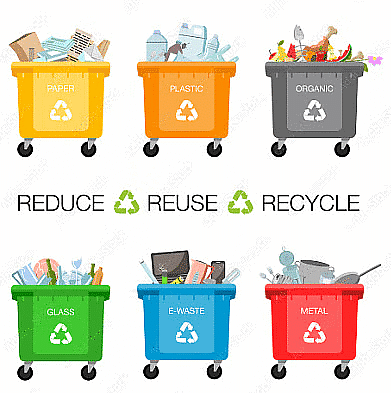
- Walk or bike for short trips; use carpools or public transport for longer ones to reduce air pollution.
- Factories should be far from cities; make less waste and treat it to be less harmful.
- Don't burn leaves, trash, or other materials.
- Plant trees around your home to clean the air.
- Separate biodegradable waste for compost and recycle non-biodegradable waste.
- Use less plastic; don't throw plastic bags outside as they block drains and cause diseases.
- Encourage people to use toilets and keep surroundings clean.
- Turn off unused lights.

Edurev Tips:
The Clean India Mission, started on 2 October 2014, involves many government employees and students to clean up 4,041 cities and towns in India. It aims to manage waste better and provide toilets to end open defecation.
Quick Revision: Different Types of Pollution

|
50 videos|90 docs|28 tests
|
FAQs on Our Environment Class 4 Notes Science
| 1. What is pollution and why is it harmful? |  |
| 2. What are the different types of pollution? |  |
| 3. How does global warming relate to pollution? |  |
| 4. What is acid rain and how does it occur? |  |
| 5. How can we reduce water pollution? |  |

|
Explore Courses for Class 4 exam
|

|
